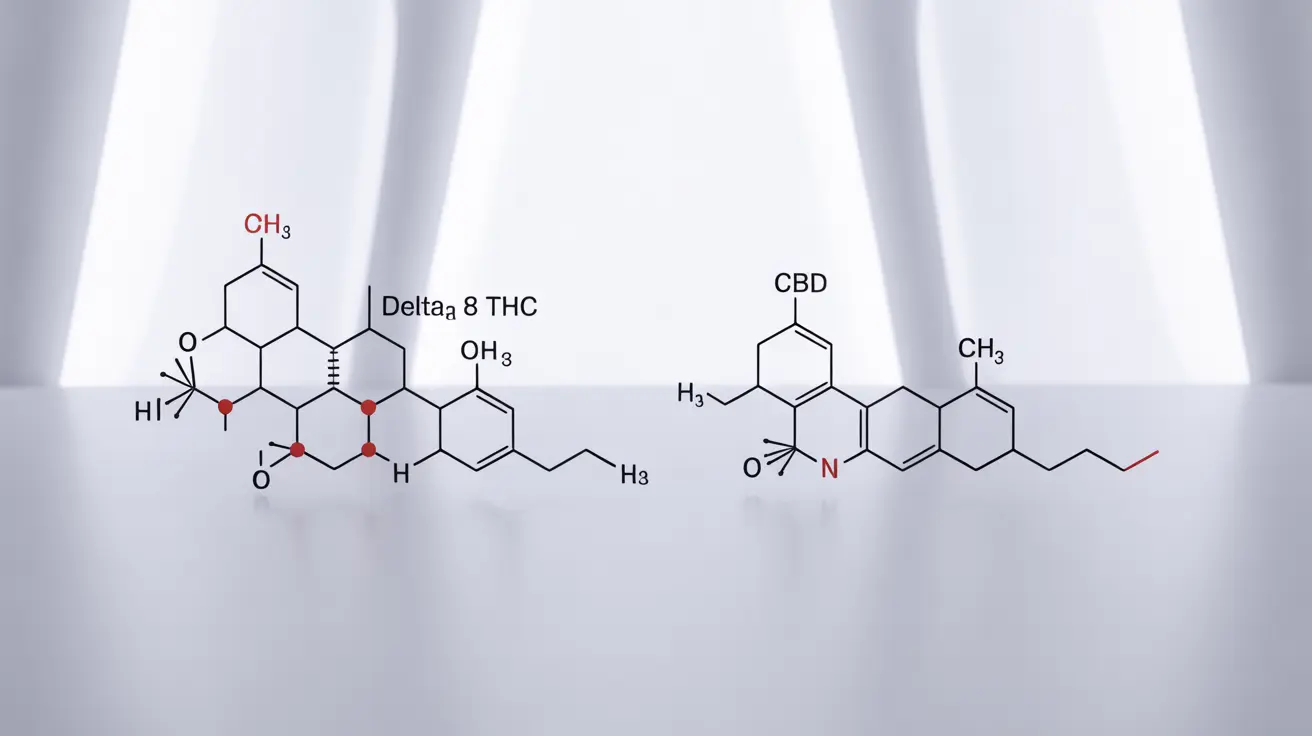As the cannabis and hemp industries continue to evolve, consumers face increasing choices when it comes to cannabinoids. Two popular options, Delta 8 THC and CBD, often create confusion due to their similar origins but distinct effects. Understanding the differences between these compounds is crucial for making informed decisions about their use.
This comprehensive guide will explore the key distinctions between Delta 8 THC and CBD, examining their effects, safety profiles, legal status, and therapeutic potential. Whether you're seeking relief from specific symptoms or simply curious about these cannabinoids, we'll help you understand which option might better suit your needs.
Chemical Structure and Origins
While both Delta 8 THC and CBD are cannabinoids found in cannabis plants, their molecular structures differ significantly. CBD (cannabidiol) is non-intoxicating and occurs naturally in high concentrations in hemp plants. Delta 8 THC, however, is typically manufactured from CBD through a chemical conversion process, as it occurs naturally in very small amounts.
Effects on the Body and Mind
Psychoactive Properties
The most notable difference between Delta 8 and CBD lies in their psychoactive effects. CBD does not produce a "high" sensation and primarily works through indirect interactions with the endocannabinoid system. Delta 8 THC, however, does create mild psychoactive effects, though less intense than its cousin, Delta 9 THC (traditional marijuana).
Therapeutic Benefits
CBD is widely recognized for its potential benefits, including:
- Anxiety reduction
- Anti-inflammatory properties
- Pain management
- Sleep improvement
- Seizure control (FDA-approved for certain conditions)
Delta 8 THC may offer similar benefits, but with additional effects:
- Mild euphoria
- Appetite stimulation
- Potential nausea reduction
- Relaxation with more noticeable mental effects
Safety Considerations
CBD has a well-established safety profile with minimal side effects when used properly. It's been extensively studied and even received FDA approval for certain medical conditions. Delta 8 THC, being newer to the market, has less research behind it and requires more caution. Users should be aware of potential risks, including:
- Unknown long-term effects
- Product quality variations
- Possible drug test complications
- Manufacturing process concerns
Legal Status and Accessibility
CBD derived from hemp (containing less than 0.3% Delta 9 THC) is federally legal in the United States, though state regulations may vary. Delta 8's legal status is more complex and contested, with some states specifically banning its sale and use. Always check local regulations before purchasing either compound.
Making the Right Choice
When deciding between Delta 8 and CBD, consider your specific needs and goals:
- Choose CBD if you want:
- Relief without any intoxicating effects
- Well-researched safety profile
- Wider legal availability
- No risk of failing drug tests
- Consider Delta 8 if you're seeking:
- Mild psychoactive effects
- Stronger appetite stimulation
- Alternative to traditional THC
- Moderate euphoric experience
Frequently Asked Questions
What is the main difference between delta 8 THC and CBD, and how do their effects compare? Delta 8 THC produces mild psychoactive effects, while CBD does not cause any intoxication. CBD focuses on therapeutic benefits without the "high," while Delta 8 offers a combination of therapeutic potential with mild euphoric effects.
Does delta 8 THC get you high like delta 9 THC, or is it more like CBD? Delta 8 THC does produce a high, but it's typically milder and less intense than Delta 9 THC. Unlike CBD, which causes no intoxication, Delta 8 creates a noticeable psychoactive effect, though users often report feeling more clear-headed than with traditional marijuana.
Is it safe to use delta 8 THC, and what are the potential risks compared to CBD? CBD has a better-established safety profile with extensive research backing. Delta 8 THC's safety profile is less understood, with potential risks including product quality inconsistencies and unknown long-term effects. CBD is generally considered safer due to its more comprehensive research history and regulation.
If I want relaxation or stress relief without feeling high, should I choose CBD or delta 8? CBD is the better choice for those seeking relaxation without any intoxicating effects. It provides stress relief and calming properties while maintaining mental clarity and allowing normal daily function.
Are delta 8 THC products legal everywhere in the US, and how does their legal status compare to CBD? CBD derived from hemp is federally legal, though state regulations may vary. Delta 8 THC faces more legal challenges, with several states specifically banning its sale and use. CBD products generally have broader legal acceptance and availability across the United States.




